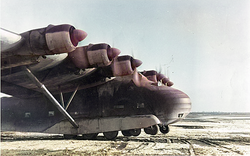C-14 Argus

|
This article or section is a work in progress. The information below may be incomplete, outdated, or subject to change. |

| |
| Type: | Heavy transport aircraft |
| Manufacturer: | |
| Operator | |
| Quantity | 0 / 337 (planned, 1732 AN) |
|
| |
| Ferry Range | 1,120 km |
| Maximum Speed | 323 kmph |
| Altitude Ceiling | 6,000 m |
| Minimum Required Runway | |
| Maximum Payload Weight | 12,000 kg |
| Armament | |
The C-14 Argus is a six-engined propeller driven heavy transport aircraft developed by Benacia Command to provide a strategic airlift capability whilst minimising the use of strategic materials in its manufacture. Whilst the limited range of the finished design would prove a disappointment to the sponsors of the programme, the decision was made to continue with the design and take it into production in order to bulk out the numbers of cargo transport aircraft reported to higher authority.
Development
The C-14 Argus was the result of a 1730 AN Benacia Command requirement for a large assault transport in preparation for a projected intervention of the Sathrati Emergency.
However, in order to stage a meaningful intervention in the Shirerithian campaign against Sathrati, Benacia Command would need to be able to airlift vehicles and other heavy equipment as part of an initial assault wave across a significant body of water. Although the intervention was cancelled in 1732 AN, the requirement for a heavy air transport capability remained, with the focus shifting to the forthcoming continental war against the Imperial Republic.
Kalavia Fixed-Wing Works of Kalgachia was duly directed by Benacia Command to dispatch a design team to Sansabury aerodrome in the tenth month of 1732 AN to commence begin working the previous development studies into a viable prototype.